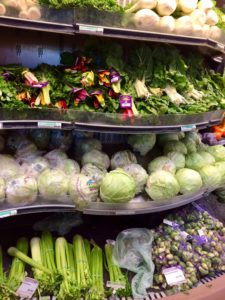
Vegetables are one of the healthiest foods on the planet, yet only 9 percent of adults eat the recommended amount, according to a recent Centers for Disease Control and Prevention study. That means Americans are missing out on many essential vitamins, minerals and fiber that are vital to our long-term health.
“A lot of people don’t get their first serving of veggies until dinner, and that’s too late,” says Sharon Palmer, RDN and author of Plant-Powered for Life. “Try to include veggies at lunch and even breakfast. Have a soup or salad with your lunch, and have slices of vegetables on your toast, or make a veggie wrap for breakfast.”
A common mistake is making salad your only vegetable for the day. “There is nothing wrong with salad, but lettuce, especially the lighter colored ones, is not one of the most nutrient-rich of the veggie family,” Palmer says.
The darker the leaves, the more nutrients you get, so swap out your pale iceberg lettuce for the dark green, leafy varieties such as spinach, kale, chard or collard greens. They are rich in calcium, iron, potassium, cancer-fighting antioxidants and vitamins A, C, K and folate. Cruciferous vegetables such as broccoli, Brussels sprouts, cabbage and cauliflower also pack a big nutritional punch, so be sure to add these superfoods to your weekly grocery list.
Research shows that a diet rich in vegetables may reduce the risk of heart disease, Type 2 diabetes and some types of cancer. Plus, the added fiber helps prevent constipation and makes you feel full longer. The USDA recommends that adults consume 2 1/2 to 3 cups of vegetables per day. Eating a variety will ensure that you get many different minerals and vitamins in your diet.
However, not all vegetables are created equal. “Starchy vegetables—even though they are nutritious—like potatoes and corn, should be limited to smaller servings at meals, especially if you are controlling your weight,” Palmer says. “Legumes, such as dried beans and peas, actually take the place of protein on the plate, so we should be eating these at least a few times a week as a protein replacement.”
Seasonal produce offers peak flavor and freshness, but all types of veggies are good for you—whether they are frozen, canned, cooked or raw, explains Palmer. However, avoid overcooking vegetables in large amounts of water, which can leach away more of the nutrients.
“The secret to a healthy diet is a wide variety of plant foods—in every color of the rainbow,” Palmer says. “Don’t get too hung up on what is more beneficial—just eat more veggies, period!”
- First published in Prime Living Magazine